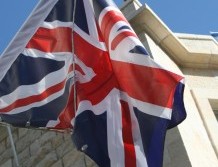The United Kingdom’s Treasury Ministry on Friday sanctioned Hezbollah’s so-called “political wing” under the Terrorist Asset-Freezing Act, with the announcement posted to the UK government website noting that even Hezbollah itself has “publicly denied a distinction between its military and political wings. The group in its entirety is assessed to be concerned in terrorism.” Israel applauded the move, which came the same weekend as dozens were injured in violent clashes between protestors and security forces in Lebanon’s capital city of Beirut.
The leader of the UK’s Treasury Ministry, Chancellor Sajid Javid, tweeted in regards to the Hezbollah sanctions, “We will take whatever action is necessary to tackle terror groups that threaten our security,” noting that Hezbollah “itself makes no distinction between its military and political wings. Nor do we.”
The Israeli Foreign Ministry tweeted that “Hezbollah is a terror group, all its units serving the same purpose” and “we expect more countries to follow the UK.” Israeli Foreign Minister Israel Katz also tweeted his approval of the move. “I applaud the UK govt for imposing sanctions on the political wing of Hezbollah that it declared a terror organization. This is a great achievement for Israel in the fight against Iran & its proxies.”
Iran has long been a key backer of Hezbollah, who effectively acts as Tehran’s proxy keeping Lebanon under Iran’s influence.
Sanctions in the UK aren’t Hezbollah’s only problem. The government heavily influenced by Hezbollah that leads Lebanon remains the target of protests. On Saturday, Al Jazeera reported that protestors in Beirut were insisting they would continue to protest in the streets until there were changes in leadership, with the report noting that as of Saturday evening Lebanese security forces had been unsuccessful in their attempts to push protestors out of the central public square in the capital. The report also cited Lebanese Internal Security Forces’ Twitter feed reporting violent clashes with anti-riot police near the Lebanese parliament building.
The Lebanese Red Cross reported on Twitter that as of late Saturday evening, over a dozen ambulances had responded to the protests in Beirut—apparently on Saturday alone—with more than 80 victims hospitalized and 140 treated on the scene.
The violence came after Amnesty International had already decried what they called “excessive force” from Lebanon’s security apparatus. On Thursday last week, Amnesty International Middle East Director of Research Lynn Maalouf was quoted in a news report on Amnesty’s website responding to the violence from earlier last week.
“It has been over 90 days since the beginning of the overwhelmingly peaceful protests amidst the Lebanese authorities’ blatant failure to address protesters’ demands and their concerns about the impact of the economic crisis,” Maalouf said. “We call on the authorities to immediately end the use of excessive force, release immediately anyone detained for peaceful protest, and hold those responsible for arbitrary or abusive force responsible in a transparent and impartial manner.”
While the Lebanon protests are targeting an economic crisis in their own country, the United States believes the instability in multiple countries in the region—including Lebanon—shows Iran’s power in the Middle East is tottering.
“We have seen protests against the Iranian regime in Iran, Iraq, and Lebanon, and the peoples of these three countries are all protesting the same model of corruption and sectarian violence,” said US Special Representative for Iran Brian Hook in comments released by the State Department on Friday.
“And we fully expect these protests to continue because the Iranian regime is facing a crisis of legitimacy and credibility. We expect that to deepen in 2020, not just in Iran but in other states.”
(By Joshua Spurlock, www.themideastupdate.com, January 19, 2020)

